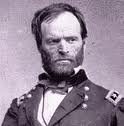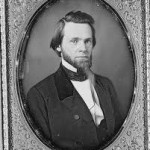 Sherman’s guardian angel was his brother and Senator John Sherman. The General had two other brothers, Charles and Hoyt, one a respected judge and the other a successful banker. After the death of his father, William, at nine years old, was raised by the prominent Ewing family of Lancaster, Ohio. William T. Sherman, known by friends and relatives as “cump,” would eventually marry a Ewing daughter, Ellen.
Sherman’s guardian angel was his brother and Senator John Sherman. The General had two other brothers, Charles and Hoyt, one a respected judge and the other a successful banker. After the death of his father, William, at nine years old, was raised by the prominent Ewing family of Lancaster, Ohio. William T. Sherman, known by friends and relatives as “cump,” would eventually marry a Ewing daughter, Ellen.
At sixteen, Sherman’s stepfather, Senator Thomas Ewing, arranged an appointment for the young man to attend The United States Military Academy at West Point. William proved an excellent student, however his deportment was lacking. Sherman related on his Academy experience;
“At the Academy I was not considered a good soldier, for at no time was I selected for any office, but remained a private throughout the whole four years. Then, as now, neatness in dress and form, with a strict conformity to the rules, were the qualifications required for office, and I suppose I was found not to excel in any of these. In studies I always held a respectable reputation with the professors, and generally ranked among the best, especially in drawing, chemistry, mathematics, and natural philosophy. My average demerits, per annum, were about one hundred and fifty, which reduced my final class standing from number four to six.”
William T. Sherman graduated in 1840, and after assignments in Southern states, he was transferred to California and surveyed town sites in many areas of the newly conquered territory. In 1850, Sherman was promoted to Captain and married Ellen Ewing. He resigned his commission in 1853 and attempted a career in banking and then the law, however neither were successful. Some historians have written that Sherman’s failure in business was the result of “nervous asthma”, which today might be referred to as anxiety attacks. Sherman was definitely having difficulty adapting to civilian life, however his brothers and father-in-law supported his efforts.
In 1859, the state of Louisiana was opening a military college and Sherman became its first Superintendent.
 A portion of a letter from Senator John Sherman to William Sherman in January 1861, states; “I have spoken to General Scott and he heartily seconds your desire to return to duty in the army. I am not at all sure but that, if you were here, you could get a position that would suit you. I see many of your friends of the army daily
A portion of a letter from Senator John Sherman to William Sherman in January 1861, states; “I have spoken to General Scott and he heartily seconds your desire to return to duty in the army. I am not at all sure but that, if you were here, you could get a position that would suit you. I see many of your friends of the army daily
John Sherman writes his brother in April of 1861; “I have spent much of the day in talking about you. There is an earnest desire that you go into the War Department, but I said this was impossible. Chase is especially desirous that you accept, saying that you would be virtually Secretary of War, and could easily step into any military position that offers.
“It is well for you seriously to consider your conclusion, although my opinion is that you ought not to accept. You ought to hold yourself in reserve. If troops are called for, as they surely will be in a few days, organize a regiment or brigade, either in St. Louis or Ohio, and you will then get into the army in such a way as to secure promotion. By all means take advantage of the present disturbances to get into the army, where you will at once put yourself in a high position for life. I know that promotion and every facility for advancement will be cordially extended by the authorities. You are a favorite in the army and have great strength in political circles. I urge you to avail yourself of these favorable circumstances to secure your position for life ; for, after all, your present employment is of uncertain tenure in these stirring times.”
William T. Sherman reluctantly resigned his position at the College and travels to St. Louis where he is commissioned Colonel of the 13th Volunteer Infantry in May of 1861.
John Sherman states in a letter of late May 1861;
“You are regarded with favor here. It will be your own fault if you do not gain a very high position in the army.”
Colonel Sherman’s next post was commanding a brigade, under General McDowell in the Washington defenses. At the battle of first Bull Run, Colonel Sherman endured his baptism of fire on July 21, 1861.
William T. Sherman, was promoted to Brig. General of Volunteers by President Lincoln on July 23,1861 and he ultimately replaced General Robert Anderson in Kentucky.
As he assessed his command, he began a series of correspondence to his superiors, relating the number of troops needed to confront the Confederate forces that held Columbus, Bowling Green and the Cumberland Gap. Sherman felt that his forces needed additional supplies and in October of 1861, he stated that he required an additional 200,000 troops in order secure the border state.
Sherman’s fears, which were later confirmed, leaked to the press and the newspaper’s had a field day. All the media proclaimed that General William T. Sherman was “insane.” In early November, Sherman demanded to be relieved and General Halleck deemed him unfit for service. General Sherman traveled home to Lancaster, Ohio for rest and relaxation. He would later state that the concerns for his army had “broke him down.”
By December of 1861, General Sherman returned to light duty and was eventually given command of the District of Cairo.
John Sherman wrote in February of 1862;
“I was infinitely rejoiced to see in this morning’s paper the announcement that you were to command at Cairo. I sincerely hope it is true, [if so, you will have a noble opportunity to answer those who have belied you. Take my advice, be hopeful, cheerful, polite to everybody, even newspaper reporters. They are in the main, clever, intelligent men, a little too pressing in their vocation.
Above all things, be hopeful and push ahead. Active, bold, prompt, vigorous action is now demanded. McClellan is dead in the estimation of even military men.”
 General William T. Sherman operated, out of Cairo, in a supporting role to General Grant’s victory at Fort Donelson. Sherman wired Grant shortly after the battle;
General William T. Sherman operated, out of Cairo, in a supporting role to General Grant’s victory at Fort Donelson. Sherman wired Grant shortly after the battle;
“I feel anxious about you as I know the great facilities [the Confederates] have of concentration by means of the River and R Road, but [I] have faith in you — Command me in any way.”
The Battle of Fort Donelson was the beginning of a mutual military relationship and the winning combination of the Sherman and Grant team would eventually bring the Confederacy to its knees, two military leaders that had social and mental short comings, that enhanced their unique and tenacious abilities to wage war on an uncompromising level.
General William Tecumseh Sherman and Lt. General Ulysses S. Grant needed each others support, not only to end the war, but to also deal with post conflict, governmental and civil turmoil.
Grant didn’t have the political and social support that Sherman had, but Sherman’s loyalty lasted Grant a lifetime.
General William Tecumseh Sherman said it best;
“Grant stood by me when they said I was crazy,
I stood by Grant when they said he was drunk.
Now, we stand by each other, always.”
Bummer

